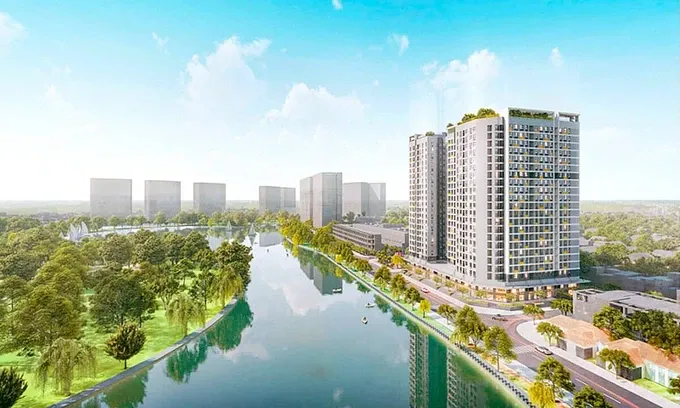
At the 5th annual Spring Real Estate Forum organized by the Vietnam Real Estate Association yesterday in Hanoi, experts predicted that the real estate market in 2025 will have many opportunities for development amidst continued economic growth. However, many challenges are still ahead, requiring ministries, agencies, localities and businesses to join hands to resolve them.
At the forum, Vietnam Association of Construction Contractors (VACC) Chairman Nguyen Quoc Hiep noted that while January is traditionally a slow month for real estate sales, new projects launched by member companies are performing better than expected. This suggests a continuing recovery in the real estate market and growing purchasing power among buyers.
Explaining the recent positive signals of the real estate market, expert Can Van Luc, member of the National Financial and Monetary Policy Advisory Council, said that Vietnam's economy in 2024-2025 will grow quite high. Moreover, institutional breakthroughs, revolution in streamlining the organizational apparatus are important driving forces for the entire economy, including the real estate sector.
In addition, comprehensive urban planning, infrastructure investment policies, and increased public spending have all contributed to the gradual recovery of the real estate market, says expert Can Van Luc. Based on these factors, he expects the real estate market to see new development opportunities in 2025 and beyond.
With the same view, Chairman Tran Ngoc Chinh of the Vietnam Urban Planning and Development Association was expecting that transport infrastructure projects such as airports, highways, and railways are opening up new development spaces. For example, the construction of Long Thanh airport in the Southern Province of Dong Nai and Gia Binh airport in the Northern Province of Bac Ninh is expected to form new, vibrant urban areas, changing investment thinking and leading to a shift in capital flows.
In particular, the TOD model (urban development with public transport as the center) is being focused on in the transport infrastructure development strategy, which will be a great opportunity for the real estate market.
Experts have observed that legal obstacles have recently been gradually removed from commercial and social housing projects, allowing them to continue completion and sales indicating that the real estate market is becoming lively again.
Most recently, Deputy Prime Minister Tran Hong Ha chaired a meeting, along with online sessions with various ministries, agencies, and localities, to discuss the draft decree detailing the implementation of the National Assembly's resolution on piloting commercial housing projects through agreements on receiving or having land use rights. This is also seen as a favorable condition to increase market supply in the near future.
Despite some positive indicators, the real estate market in 2025 is still projected to lack a major breakthrough, as ministries and local authorities must soon address numerous challenges and obstacles.
In particular, land price verification is the hottest issue at present.
VCCA Chairman Nguyen Quoc Hiep said that as of January 2025, about 25 provinces and cities have announced new land price lists. However, due to the land price calculation structure, combined with inadequate input factors, land prices have increased. Currently, many businesses have been unable to calculate land prices for 1-2 years, leading to a delay for new projects.
Chairman Le Van Binh of the Vietnam Real Estate Brokers Association noted that while legal procedures have seen many obstacles removed, the land valuation mechanism remains undefined, and there are still numerous shortcomings in its local implementation.
Currently, in many places, there are still differences in views between land valuation consultants, land valuation councils and competent authorities deciding on land prices.
At the forum, experts emphasized that for the real estate market to thrive in 2025, ministries, agencies, and local authorities must address several key issues. These include streamlining administrative procedures, simplifying the process for planning adjustments, and supporting site clearance - particularly the need for investors to negotiate with landowners on small and medium-sized projects.
The auction of land use fees is also inadequate when the starting price, capacity of the auction participants, sanctions sometimes are not suitable.
Above all, experts said that management agencies need to create more favorable conditions for businesses to build social housing, creating more open conditions in accessing capital sources for social housing.
























